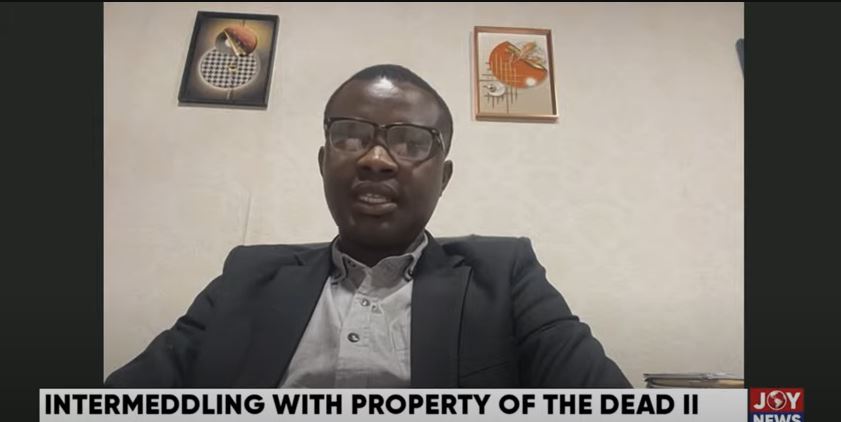A private legal practitioner, Albert Gyamfi says he does not see anything wrong with the advice proffered to the police by the Attorney-General [AG] on the Cecilia Dapaah saga.
The lawyer explained that the Attorney-General is responsible for initiating and conducting all prosecutions in the country, therefore in suggesting how the police must carry out investigations regarding the case in question, the Attorney-General had not breached any rule.
In a discussion on JoyNews’ The Law, Mr Gyamfi emphasised that “The discretion to prosecute or not is with the Attorney-General. The discretion to proffer which charges and which charges not to proffer is with the Attorney-General.
"So despite the investigations that the police are carrying, and despite the preliminary charges the police will proffer against an accused person, the final say is with the Attorney-General, and the Attorney-General will usually do so in the form of advice, and the police have to go in accordance with the advice given by the Attorney General, they cannot go contrary to it.
“So, I don’t see anything wrong in the AG proffering advice to the police on how to carry out that investigation, and I have heard the advice, and in my view, I don’t see anything wrong.”
Additionally, the lawyer highlighted that although one of the roles of the Attorney General is to delegate its prosecutorial powers to some persons such as police officers not below a sergeant rank, the AG eventually supervises those people to whom he has delegated his powers.
Mr Gyamfi further pointed out that, “the AG has the power to recall a case docket. And some cases which are to be prosecuted by these public attorneys are to be submitted to the Attorney-General for advice.”
The lawyer then stated that the Attorney-General must be commended for his intervention instead of being condemned.
Mr Gyamfi, however, added that the public skepticism over the intervention of the Attorney-General in Madam Dapaah’s case can be attributed to the fact that the Attorney-General doubles as the Minister for Justice.
According to the lawyer, based on this awareness, there is a general perception that the Attorney General's affiliation with the ruling political party may influence the prosecution.
But he blamed this mistrust on the fact that successive governments have created a norm whereby the Attorney-General doubles as a Minister of Justice. This, he explained is not how it has been stated in the Constitution.
“The only requirement mentioned [in the Constitution] is that the Attorney General must be a Minister of State. So, you are to be a Minister first before you qualify for appointment as the Attorney-General.
“And as such, most successive governments have created the Ministry of Justice so whoever occupies the position of Minister of Justice, also doubles as the Attorney-General even though there is no state constitutional requirement that that should be the case.”
Again, Mr. Gyamfi emphasised that the mistrust in the Attorney-General can only be rectified by separating the office of the Attorney-General from that of the Minister of Justice.
“The office of the Attorney-General should be separated from the Minister of Justice. The Attorney-General should not be a politician, so that at least, that public perception of politics would be out of the way of the Attorney-General, so he can do his work,” the lawyer argued.
Latest Stories
-
Director urges parents to protect children from abuse
24 mins -
Imani-Ghana criticises Akufo-Addo for not lauding Fourth Estate’s contribution to social development
31 mins -
Man remanded for allegedly stabbing businessman with broken bottle and screwdriver
57 mins -
Population in Kumasi Central Prison surges to 1800, threefold exceeding capacity
1 hour -
NPP to conduct La Dadekotopon parliamentary primary today
1 hour -
KPMG’s report on GRA and SML deal, government white paper on report and matters arising
1 hour -
I won’t reply to Chris Brown tour criticism – Ayra Star
1 hour -
British Columbia to back off drug decriminalisation project
1 hour -
Veteran commentator Joe Lartey Sr dies at 96
1 hour -
Livestream: Newsfile discusses KPMG report on SML deal, ILO on SSNIT reserves and NDC’s running mate
2 hours -
Ghanaian activist hugs over 1,100 trees in an hour to set Guinness World Records
2 hours -
Mathew Anim Cudjoe’s Dundee United promoted to Scottish Premiership after Championship win
2 hours -
NSMQ star Jochebed Adwoa Sutherland sweeps 12 awards at UG Vice-Chancellor’s Ceremony
3 hours -
Ghana’s Education Quality ranked 125 out of 183 countries in latest Global Youth Development Index
3 hours -
Emma Stone wants people to use her real first name
3 hours

